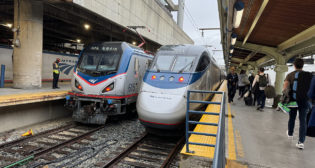
Amtrak’s “Mutual Agreement to Arbitrate”
Written by William C. Vantuono, Editor-in-ChiefA change to the so-called “Arbitration Clause” buried deep within Amtrak’s “Terms and Conditions” for ticket sales that stipulates mandatory arbitration—effectively, preventing passengers from filing lawsuits against Amtrak “including, but not limited to, claims for negligence, gross negligence, physical impairment, disfigurement, pain and suffering, mental anguish, wrongful death, survival actions, loss of consortium and/or services, medical and hospital expenses, expenses of transportation for medical treatment, expenses of drugs and medical appliances, emotional distress, exemplary or punitive damages arising out of or related to any personal injury,” has captured the attention of legislators and passenger rail advocates.
The 488-word Arbitration Clause (full text below) appears two-thirds of the way into Amtrak’s 15,500-word Terms and Conditions. The modification to the clause occurred earlier this year, closely following a $265 million court settlement resulting from Amtrak’s May 12, 2015 Frankford Junction overspeed derailment in Philadelphia on the Northeast Corridor, in which eight people died and 238 were injured. The clause received almost no attention until Nov. 8, when Politico broke the story. It is expected to be addressed at a Nov. 13 House Transportation Committee Subcommittee on Railroads, Pipelines, and Hazardous Materials hearing on Amtrak, and has also caught the attention of the Senate Commerce Committee, which has Amtrak oversight.
Federal law prohibits airlines from such a practice, but bus operators, cruise ship lines and rideshare companies already have such an arbitration clause that prohibits post-crash passenger/survivor lawsuits.
The Politico story, verbatim:
“Passengers and their survivors won a $265 million court settlement with Amtrak after a 2015 derailment in Philadelphia killed eight people and injured hundreds more.
“But if such a crash happened today, the victims would not be able to sue. That’s because of a clause the passenger rail line quietly added to its ticket purchases in January, which forces disputes into arbitration with no right to go before a judge or jury.
“The change is bringing objections from consumer advocates, who note that it covers scenarios ranging from ordinary ticketing complaints up to wrongful death, and even includes minors who had the tickets purchased for them. And it could soon get Congress’ attention.
“The language has flown under the radar so far, but may burst into view when the House Transportation Committee holds a hearing on Amtrak next week.
“‘It is one of the most anti-consumer and passenger clauses I’ve ever seen,’ said Julia Duncan, Senior Director for Government Affairs at the American Association for Justice, which represents trial lawyers.
“Duncan said Amtrak’s arbitration clause is unusually broad and detailed, noting that the policy describes a wide array of possible incidents that would have to go to arbitration. ‘Most forced arbitration clauses do not go into much detail about what they cover,’ she said.
“Airlines are prohibited by law from using mandatory arbitration, but Duncan said it’s prevalent across other transportation sectors including bus travel, rideshare and cruise lines.
“Amtrak spokesperson Kimberly Woods said the clause was added to resolve customer claims more efficiently. She said it won’t affect most customer complaints, which are settled directly with the railroad.
“The change has already caught the attention of at least one member of Congress: Sen. Richard Blumenthal (D-Conn.), who said his office is looking into the issue.
“‘There’s no reason why consumer complaints about Amtrak should involve mandatory arbitration. Consumers might wish to have arbitration … but they shouldn’t be forced to,’ Blumenthal said. He sits on the Senate Commerce Committee, which oversees Amtrak.”
“Binding mandatory arbitration is nothing new,” noted one rail industry observer. “It has been a problem that has gradually been getting worse for a few decades, and it has been impossible for consumers to do anything about it. The courts, all the way up to the Supreme Court, have ruled that it’s a perfectly acceptable practice, because no one is forcing you to buy a particular product.”
Observed another: “Forcing customers to accept arbitration is the hot new strategy all across corporate America—of which Amtrak is a member by brevet because Congress created it as a ‘private corporation.’”
Arbitration Agreement
Mutual Agreement to Arbitrate (“Arbitration Agreement”). This Arbitration Agreement is intended to be as broad as legally permissible, and, except as it otherwise provides, applies to all claims, disputes, or controversies, past, present, or future, that otherwise would be resolved in a court of law or before a forum other than arbitration. Amtrak and Customer (on behalf of yourself and any individuals for whom you purchase tickets, including, without limitation, family members, minor passengers, colleagues and companions (collectively “You” or “Your”), AGREE that this Arbitration Agreement applies, without limitation, to claims Amtrak may have against You and claims You may have against Amtrak and any affiliates or related entities, or against any party to which Amtrak owes indemnity (which party may also enforce this Agreement), including without limitation any host railroad, based upon or related to: these Terms and Conditions, breach of contract, tort claims, common law claims, Your relationship with Amtrak, tickets, services and accommodations provided by Amtrak, carriage on Amtrak trains and equipment, any personal injuries (), and any claims for discrimination and failure to accommodate, shall be decided by a single arbitrator through binding arbitration and not by a judge or jury. Except with respect to the Class Action Waiver below, the arbitrator, and not any federal, state, or local court or agency, shall have exclusive authority to resolve any dispute relating to the validity, applicability, enforceability, unconscionability or waiver of this Arbitration Agreement, including, but not limited to any claim that all or any part of this Arbitration Agreement is void or voidable. This Arbitration Agreement is governed by the Federal Arbitration Act (“FAA”) and evidences a transaction involving commerce. The arbitration will be conducted before a single arbitrator under the Consumer Arbitration Rules of the American Arbitration Association (“AAA”), which are available at the AAA website (www.adr.org). A court of competent jurisdiction shall have the authority to enter judgment upon the arbitrator’s decision/award. The parties agree to bring any claim or dispute in arbitration on an individual basis only, and not as a class or representative action, and there will be no right or authority for any claim or dispute to be brought, heard or arbitrated as a class or representative action (“Class Action Waiver”). Regardless of anything else in this Arbitration Agreement and/or the applicable AAA Rules, any dispute relating to the interpretation, applicability, enforceability or waiver of the Class Action Waiver may only be determined by a court and not an arbitrator. This Arbitration Agreement does not apply to any claim or dispute that an applicable federal statute states cannot be arbitrated.



